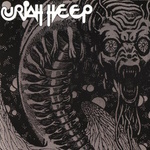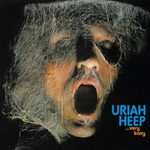

Name (UK): ...Very 'Eavy ...Very 'Umble
Name (US): Uriah Heep
Release Date (UK): 1970 June 13
Release Date (US): 1970 August
Score: 76
Finished: 2022 June 28
Published: 2023 March 16
...Very 'Eavy ...Very 'Umble released in the United Kingdom on 13th June, 1970 and arrived in the United States in August that year as Uriah Heep. This is the debut album of the hard prog rock band Uriah Heep and it is interesting. It is simultaneously "very heavy" and "very humble". It features eight songs, with one song, "Lucy Blues", being changed out for an earlier recording of the song "Bird of Prey" in the US. The US version also changes the cover from David Byron's face to a centipede monster. Prior to this album, Uriah Heep had been known as a smalltime band called Spice. Gerry Bron, their producer, well, their other producer besides Paul Newton Sr. (this causes a lot of conflict), suggested renaming themselves to Uriah Heep around the time Ken Hensley joined the band, replacing session player Colin Wood. Hensley joined too late to get any writing credits, but he would be making his mark on the band soon enough. The lineup of this album consisted of David Byron on lead vocals; Ken Hensley on organ, slide guitar, Mellotron, piano, backing vocals; Mick Box on lead guitar, acoustic guitar, and backing vocals; Paul Newton on bass guitar and backing vocals; and Nigel Olsson on drums on "Lucy Blues" and "Dreammare". Former members: Alex Napier on drums for all songs except "Lucy Blues" and "Dreammare"; and Colin Wood on keyboard for "Come Away Melinda" and "Wake Up (Set Your Sights)". The US version, due to swapping "Lucy Blues" for "Bird of Prey" includes the additional credit: Keith Baker on drums for "Bird of Prey".
Side A opens with the song that has been performed at virtually every single Uriah Heep concert since 1970: "Gypsy". Being used to the 2001 version (from Remasters: The Official Anthology) with Bernie Shaw, this was a stark contrast to the newer version. It is "Very Eavy" the whole way through, and devolves into a bit of aimless jamming in the middle, but gets back on track for the last bit of the song. I think it's a bit harsh on the ears in the beginning, but it is an undeniable classic of early hard rock. Next is the song "Walking in Your Shadow", also of the "very 'eavy" persuasion. It has a nice guitar part and the lyrics are not too bad either. It's a decent song, but nothing super outstanding. Next is a cover of the song "Come Away Melinda", and one of two songs Wood played keyboard for on this album. It's a very sad anti-war song originally written in 1963. This song, along with Gypsy, are the only two songs from this album that stood the test of time, so to speak. In other words, those are the only two songs from this album to still be performed in recent years. This rendition is very touching, with Byron's lyric really selling the tone of the words. Going back to the 2001 version, Shaw does an admirable job, but it's tough going up against Byron. Side A closes out with "Lucy Blues" in the UK version and "Bird of Prey" in the US version. "Lucy Blues" is, well, a blues song, but it's not all that remarkable. I think with some work, it could've been really good, but I think it's telling that apparently "back in the Spice days" this song was performed almost entirely via ad lib and only attained a firm form with this version. It's an experiment, and this one is kind of a fail. "Bird of Prey", on the other hand, is not a failure. It's actually pretty good. This song released as a B-side on a single in the UK, so it isn't completely unique to the US version, though most people probably know it in its rerecorded form on Salisbury. There are some nice harmonies and guitaring. Byron's vocal recording has some echo to it or something, it sounds a little odd, but I think it actually somewhat adds to the charm.
Opening Side B is the song Dreammare. It starts gentle and quickly grows into a hard rocker. I really like the lyrics and honestly, I just really like the song. It's probably my favorite song on the album. Next is Real Turned On. It's about a guy that is real turned on and wants to make love. It kinda gets a little icky, the implication of unconsensual activity is there. The instrumental part is catchy though. The lyrics just aren't going to win any awards, especially nowadays. After that is "I'll Keep On Trying" which is a decent song. It's highly energetic with some neat harmony and some intense soloing in the middle. There are a lot of tempo changes, making it frantic at times. Closing off the album is the song "Wake Up (Set Your Sights)" which is another anti-war song. It's pretty catchy and contains many fast and slow sections. A good way to end off the album, I'd say.
There is one outtake from this album, "Born in a Trunk". It's easy to see why it was left off the album proper. One other song that has been included with a couple later releases is the song "Magic Lantern" which isn't really much more than jamming for eight minutes and some neat ideas here and there. It would have been cool to see what might have come from this had it been more developed, but alas, this is all we're going to get.
It's a weird start for sure, but every band has to start somewhere. This album was notoriously panned by critics upon release, the most infamous of which is the Rolling Stone review by Melissa Mills, that opens "If this band makes it, I'll have to commit suicide. From the first note you know you don't want to hear any more." Despite the overly negative reception, Uriah Heep didn't give up, and the next year they released Salisbury. I don't think this album is a terribly strong one, and therefore is hard to recommend, especially if you're new to Uriah Heep. It doesn't really represent them well and could easily dissuade someone from looking further into their work if they are unfamiliar with it. My favorite song on this album is "Dreammare". There is a funny story behind the UK cover: To go all-in on the Charles Dickens theme, the cover was going to be a dusty, cobweb-filled Victorian study. Box was bored with the whole thing so he left to "get a few pints" and when he came back, took the spider web machine and got Byron's attention. When he turned, Box sprayed him and the photographer happened to take a picture of it and thus, the UK cover was born.
-Hat Kid
Back to Review List
-----